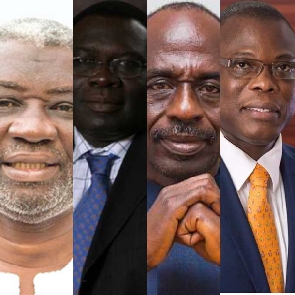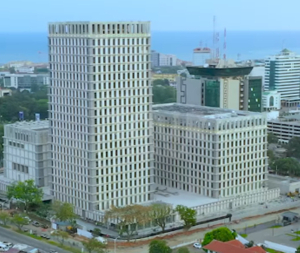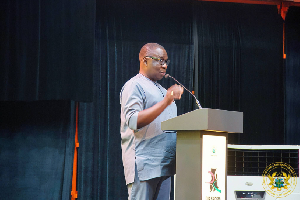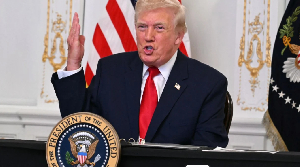For at least the next four years, Fifi Fiavi Kwetey will lead the country’s current largest opposition party, the National Democratic Congress (NDC), as its general secretary.
The position that makes him the party's Chief Executive Officer has been sought after by many, especially now that the one man who occupied that seat for 27 years decided to hang his boots.
The exit of Asiedu Nketiah as General Secretary was all that was needed for Fifi Kwetey to try his chances at the available job, and he got his acclamation.
From the just-ended National Delegates Congress that was held at the Accra Sports Stadium, where over 9000 delegates cast their votes, Fifi polled an overwhelming 4,543 votes over his closest contenders, Dr. Peter Boamah Otokunor and Elvis Afriyie Ankrah.
He, therefore, becomes the NDC's fourth General Secretary since the party's establishment in 1992.
So, who are those who preceded the former Member of Parliament for Ketu South, Fifi Fiavi Kwetey, as NDC General Secretaries?
Hudu Yahaya
Hudu Yahaya was elected the first-ever General Secretary of the NDC in 1992.
He stayed in the position until 2002.
Under his leadership, the NDC won the 1992 and 1996 presidential elections.
At age 27, Hudu Yahaya was appointed the Northern Regional Minister.
He later became the Minister for Trade, and Tourism, and Mobilization, running both ministries concurrently.
He served as a member of the legal committee and chairman of the conflict resolution committee of the NDC.
Having served the party from 2002 to 2014 as a National Vice Chairman, Hudu Yahaya became the longest-serving vice chairman of the party.
He made unsuccessful attempts at becoming the national chairman of the NDC.
Dr Josiah-Aryeh
After the exit of Hudu Yahaya, Dr Josiah-Aryeh took over as the party's general secretary.
According to details shared on strasbourgconsortium.org, Dr Nii Armah Josiah-Aryeh was born in 1958 at Jamestown in Accra.
After attending Accra High School and Achimota School, he read English, Modern History, and Law at the University of Ghana and was active in student politics.
He was called to the bar in 1983. In April 1984, he left for the UK on self-financed postgraduate education, where he obtained an LLM (LSE), Certificate in Law Teaching (UC, London), and PhD (SOAS).
He returned to Ghana in January 1998 as a private legal practitioner and
lecturer at his alma mater.
His weekly Upper-Cut articles for the mass-selling Daily Graphic established him as an incisive thinker on national affairs.
In 2000, he unsuccessfully stood for parliament but went on to become General Secretary of the main opposition NDC at arguably the most turbulent period of competitive
democratic politics in Ghana's history.
Shortly after the 2004 elections, he was suspended from the General Secretary position following allegations of intended defection for monetary gains.
He has produced legal texts - Ghana
Law of Wills, Property Law of Ghana, Islamic Customary Law in Ghana, and co-edited Ghana Law Since Independence, published by his Faculty of Law as part of Ghana's Golden Jubilee celebrations.
Dr. Josiah-Aryeh Aryeh was appointed National Chairman of the National Democratic Party (NDP) following its establishment by the wife of the NDC's founder, Flt Lt Jerry John Rawlings, Nana Konadu Agyeman-Rawlings.
He died in December 2016 after a protracted illness.
Johnson Asiedu Nketiah
Asiedu Nketiah, known popularly as General Mosquito, remains the longest-serving General Secretary of the NDC.
After he was elected in 2005, he only stepped down in December 2022, after he announced his bid to move a step further by running for the seat of National Chairman; a position he convincingly won.
Born on December 24, 1956 at Seikwa, Mr Asiedu Nketia, alias ‘’ General Mosquito,’’ started his political career when he was elected to represent Seikwa at the first Wenchi District Assembly in 1989.
He used his position as an assemblyman to rally his constituents behind some of the most ambitious development projects ever seen in the Seikwa area, including the Nkoranman Secondary School project, the Seikwa Health Centre, the Seikwa and Dagadu Maize Markets projects, and the Extension of Seikwa Palace.
When Ghana decided to change to constitutional rule, Asiedu Nketia was elected to the Consultative Assembly which drafted the 1992 Constitution, and his performance at the assembly earned him the accolade “Heavy Weight”.
Upon his election to the Consultative Assembly, he resigned from his position as bank manager and was almost immediately engaged as an Investment Analyst by the National Trust Holding Company Ltd.(NTHC).
Here too, he had to combine his duties at the assembly with a Stock Brokerage Investment Analysis course at the Ghana Stock Exchange on a part-time basis. Upon graduation, Asiedu Nketia was adjudged the best student not only for his class but also for the whole period since the course was established.
Mr Asiedu Nketia became the target of other emerging stock-brokerage companies who were proposing mouth-watering conditions as a means of poaching him from NTHC.
Parliamentary elections
As fate would have it, it was precisely at this time that the youth of the Wenchi West Constituency, after the promulgation of the 1992 Constitution, were mounting pressure on elders to again bring him back to contest the parliamentary elections.
Asiedu Nketiah’s decision to yield to the call to serve his community for the third time, denying himself these great financial opportunities, came as a shock to the management of NTHC.
The fact that he was retained as a Member of Parliament for 12 years and received an honour from Parliament speaks volumes of his performance.
He served on several committees of Parliament, including the Appointments Committee, Finance Committee, Public Accounts Committee, Chairman, Mines and Energy Committee, and Minority Spokesperson on Food, Agriculture and Cocoa Affairs .His achievements included the connection of Seikwa to the national grid; permanent structures of the Seikwa Market and lorry park complex; rehabilitation and extension of the Seikwa water supply system.
Deputy Minister
From 1997 – 2001, he served as a Deputy Minister of Food and Agriculture (Crops) and policies he successfully implemented during his tenure included: Unified Agric Extension System; Decentralisation of MOFA; Youth in Agriculture; High Tech Cocoa maintenance; introduction of improved varieties of cassava, maize and rice.
In 2004, his decision not to seek re-election to Parliament to join his wife in Canada seemed a perfect one as his party, the National Democratic Congress (NDC), lost the election that year.
Defeat
This defeat, the second in a row, resulted in deep divisions within the party and various factions were formed which in turn led to a feeling of hopelessness among the rank and file of its members at the grass roots.
Matters were made worse by the intensive propaganda campaign of criminalisation allegedly waged by the New Patriotic Party (NPP) government against NDC ministers aimed at destroying the party completely.
It became very clear to political analysts that the only way to save the NDC was to have a leadership that could not only unite the various factions but also courageously face up to the NPP's intimidations.
It did not take long for Asiedu Nketia to be identified as one of the team members to do the job. Pressure from the rank and file started mounting on him to abandon his travel plans to take up the position of General Secretary of the NDC. At the party’s delegate congress held at the Koforidua EREDEC Hotel, Mr Asiedu Nketia was elected General Secretary.
General Secretary
In December 2005, he won with almost 80 per cent of the votes to become the third General Secretary of the NDC.
Under his leadership rose a re-invigorated NDC ready to match the NPP boot for boot in what was termed as the “Mother of all Elections” in 2008. The result of the election was that Prof. Evans Atta Mills of the NDC won it under the leadership of the Asiedu Nketia team.
It is no wonder that in spite of public pronouncements by key power brokers within the NDC against his re-election, the delegates at the National Congress of the party held in Tamale in January 2010 delivered a 93 per cent vote in his favour to continue with the better Ghana Agenda of the ruling NDC.
Profile of Fifi Fiavi kwetey
Fifi Fiavi Franklin Kwetey is a Ghanaian politician and former Member of Parliament for the Ketu South Constituency in Ghana. He served in Parliament as a National Democratic Congress (NDC) Member of Parliament from January 2013 to January 2021.
Fifi Fiavi Franklin Kwetey was born on June 2, 1967. He was born in Hohoe, a town in the Volta Region to Mr. and Mrs. Kwetey.
Fifi Fiavi Franklin Kwetey’s father is Joseph Kofi Kwetey. His mother is Benonia Essie Kwetey. The father comes from Nogokpo, and the mother comes from Denu, all in the Volta Region. The father was a former branch manager of Barclays Bank in Hohoe, while his mother was at the time a senior nurse at the Hohoe Hospital.
Fifi Fiavi Franklin Kwetey is a native of Nogokpo, in the Volta Region of Ghana.
He is happily married to Naomi Kwetey and they have 4 children together.
At the age of 4, following his mother’s opening of private midwifery in Aflao, Fifi Kwetey, whose father and mother come from Nogokpo and Denu respectively, moved to Aflao.
He began schooling in the town next door, Lome, which is within walking distance for most children in Aflao. His primary school was Ecole Christ Roi in Kordzoviakorpe, just across the border.
From there, Fifi Fiavi Franklin Kwetey did 4 years of secondary education at the then prestigious College Protestant in Lome, where he obtained the Brevet D'Etudes du Premier Cycle (BEPC).
In 1984, he enrolled for the first time in an English speaking school – that is, Bishop Herman College in Kpando. By 1987 he had obtained His O level. In that year, Fifi Fiavi Franklin Kwetey was adjudged by the West Africa Examinations Council (WAEC) as Ghana’s best student and one of the three best students in west Africa. Fifi Fiavi Franklin Kwetey moved from there to Achimota school for his A levels.
The University of Ghana was next, where he graduated in 1993, having studied Economics and Psychology.
In his final year at Legon, he became the chairman of the NDC on the campus, this was ahead of the Nov-Dec 1992 elections.
In 1994, he obtained the Diplômes de la Chambre de Commerce et d’industrie de Paris (CCIP) (Chamber of Commerce and Industry’s Higher Diploma, Paris).
After his A Level, Fifi Kwetey did his national service program where he taught English at Tokor Junior High School (JHS), in Aflao. This was from October 1989 to June 1990.
The next working opportunity was when he did his second national service with the office of Parliament from October 93 to July 94.
Fifi Fiavi Franklin Kwetey joined the Investment Banking firm, Strategic African Securities Ltd in July 1995.
He worked there as a Financial Analyst and a stockbroker. During this period, he played a pivotal role in establishing the company’s maiden publication of the Stock Market’s Annual Economic and Financial Review and Outlook. This was the go to analytical work at the time, which provided the most comprehensive financial and economic analysis.
He moved to join CDH Financial Holdings Ltd in April 1998 and worked there till February 2002 as a Funds Manager, Investment Analyst and a Stockbroker.
At the same time, he also became a tutor of Financial Courses at the Ghana Stock Exchange.
Whilst in university, Kwetey was a student leader, serving as the chairman for the National Democratic Congress branch on the University of Legon Campus.
In December 2005, Fifi Fiavi Franklin Kwetey contested in the national NDC executive elections and won to become the chief communicator for the NDC.
Serving as the chief communicator which his party dubbed as the party’s Propaganda Secretary, he was seen as the person to criticize the other parties and raise pertinent issues regarding their parties whilst defending his party on the necessary platforms. The position Propaganda Secretary was subsequently rebranded into the National Communications Officer
In 2012, Fifi Fiavi Franklin Kwetey won the Ketu South National Democratic Congress primaries into the 2012 Parliamentary Elections. He won the primaries by getting 403 votes as against 60 votes polled by the then incumbent Albert Ziga, who came third and Raphael Alorwu who polled 82 votes, whiles Nyphson Agbagedy also got 30 votes.
Kwetey subsequently won the Ketu South parliamentary elections by getting 77,837 votes which represented 88.92% of the votes cast against his closest contender Godwin Yayra Nkuawu of the New Patriotic party who got 4,122 votes representing 4.71%.
In 2015, Fiifi Kwetey was maintained as the National Democratic Congress candidate for the Ketu South constituency going into the 2016 parliamentary elections. He won the primaries by polling 146,10 votes representing 86.13% to beat Sylvanus Amedorme who garnered 1,375 votes and Famous Kuadugah, 637 votes at Denu in the Volta Region.
He was elected in the 2016 Elections to serve as member of parliament for Ketu South for another term in the parliament of Ghana after getting 48,723 votes representing 65.47% of the total votes against his closest contender Jim Yao Morti an independent candidate who got 18,643 votes representing 25.04%. Jim Yao Morti was a former member of the NDC who had been disqualified during the vetting process and suspended subsequently by the NDC and was contesting as an independent candidate.
Fifi Fiavi Franklin Kwetey was a leading member of the National Democratic Congress (NDC) media monitoring team ahead of the year 2000 elections-team was based at Kuku Hill Office at the then candidate of NDC Prof. John Evans Atta-Mills.
He served as a leading NDC voice on radio when call ins were introduced into political programme on radio for the first time around 1998.
Fifi Fiavi Franklin Kwetey was the Chairman of Beno’s Maternity Branch in the Ketu South Constituency.
He continues to this day to play behind the scene role in the party’s national communications bureau headed by Lawyer Sammy Gyamfi and continue to inspire many of the young activists and communicators of the NDC party.
He played a key role in the party’s economic and communication sub committee ahead of 2020 elections.
In the NDC government under President John Dramani Mahama, he also served as Minister at the presidency and then became Minister for Agriculture and Minister for Transport.
Earlier in 2009, he went through the most grueling ministerial and bravely and successfully fought off every attempt by the NPP minority to extract any admission that, the NDC campaign that led to victory in 2008 was just a campaign of lies.
He became a Deputy Minister of Finance in 2009 under former president John Evans Atta-Mills and for the next four years became the key voice of the party and government on all discussions on the economy. He is fondly remembered for being a key voice that trumpeted the “unprecedented achievements” of the Mills-Mahama Government.
He again headed a similar results collation outfit in 2012 at Ridge, which one more was successful in getting results in record time which enable the NDC to have a laugh, when the late Sir John was deluding himself and his party that, the NPP had won elections in 2012.
He also headed the party results collation outfit set up at Kanda during the 2008 elections, which successfully collated the results both in first and second rounds in record time – a feat which played a crucial role in the NDC successful blockage of the NPP last minute attempt to steal the elections in the EC strongroom. He together with others in the strongroom, fought like lions to make sure that nation wrecking plan by the NPP was foiled.
Also, ahead of the 2008 elections, he set up the NDC Forum for Setting the Records Straight and became its spokesperson.
He set up the Lens Newspaper while in the office of Jerry John Rawlings and become its managing editor.
While in that position, he became a leading voice who spoke regularly on behalf of the NDC on leading programs like Newsfile, Subsequently became host of Crossfire program on behalf of the NDC.
Fifi Fiavi Franklin Kwetey’s net worth is not made public. He served as an article 71 office holder and makes a decent income. His source of income comes from his political career, personal businesses and others.
AE/BOG
General News of Tuesday, 20 December 2022
Source: www.ghanaweb.com













